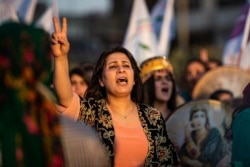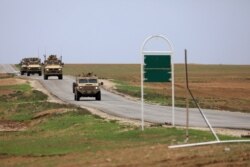Syrian Kurdish fighters said they have begun withdrawing from areas along the Syria-Turkey border as part of an agreement between the United States and Turkey.
The People's Protection Units (YPG), the main force within the U.S.-backed Syrian Democratic Forces (SDF), announced Tuesday its pullout as the first step toward implementing its part of the agreement to establish a safe zone in northeast Syria.
"In the context of the tripartite understandings [between the U.S., Turkey and SDF] regarding border security with Turkey, we have removed some earth mounds and a group of YPG fighters has already withdrawn, along with their heavy weaponry, to new positions," Zaidan al-Asi, co-chair of the defense office at the Kurdish-led administration in northeast Syria, said in a televised statement.
For months, Turkey has been threatening to carry out a military offensive in northeast Syria to push the Kurdish YPG away from its border.
Turkey views the YPG as part of the Turkey-based Kurdistan Workers' Party (PKK), which has been engaged in three-decade conflict with Turkish military for greater Kurdish rights in Turkey. The PKK is considered a terrorist organization by both Ankara and Washington.
"This withdrawal came to put an end to Turkish threats," a senior SDF official, who requested anonymity because he wasn't allowed to speak to reporters, told VOA. "There will be no YPG or SDF fighters for a depth of 5 kilometers into Syrian territory.
"However, there will be local forces from these border areas. These fighters will be allowed to remain in their areas through local military councils," the Kurdish commander added.
The SDF has been an effective partner with the U.S. in its war against the Islamic State (IS) terror group. This partnership has helped the SDF to dislodge IS militants from nearly all Syrian territory they once held since 2014 when the group emerged in Iraq and Syria.
U.S. peace efforts
Earlier this month, U.S. and Turkish officials agreed to establish a safe zone in northern Syria, which will function as a buffer zone between Turkey and Syrian Kurdish fighters.
Experts believe the YPG withdrawal can help U.S. efforts to achieve peace between Turkey and the Syrian Kurds.
"Moving YPG units out of the Syrian-Turkish border strip and replacing them with local Syrians who are mobilized under the SDF structure is the foundation of the U.S. strategy to keep Turkey at bay and to preserve the SDF," said Nicholas Heras, a Middle East researcher at the Center for a New American Security in Washington.
"Now the burden falls on Turkey to show that it can back off from its most extreme demands — which include the establishment of Turkish outposts in SDF territory, unchaperoned Turkish military patrols in SDF areas, and the use of Turkish armed drones over SDF lines," Heras told VOA.
Joint patrols
Aykan Erdemir, a senior fellow at the Foundation for Defense of Democracies, a think tank in Washington, said, "Both the Turkish government and the SDF have come to the realization that they have to curb their maximalist ambitions for northeast Syria," he told VOA.
Erdemir noted that the U.S. "has facilitated a compromise that neither party is too keen to articulate publicly."
On Monday, Turkey's defense minister, Hulusi Akar, said Turkish and U.S. troops will soon begin joint patrols as part of the safe zone deal. He said a joint helicopter flight already has taken place.
There are about 2,000 U.S. troops in Syria, U.S. defense officials say. President Donald Trump has vowed, though, to decrease that number to 400 troops.






